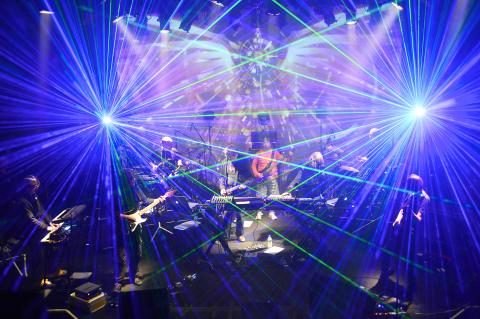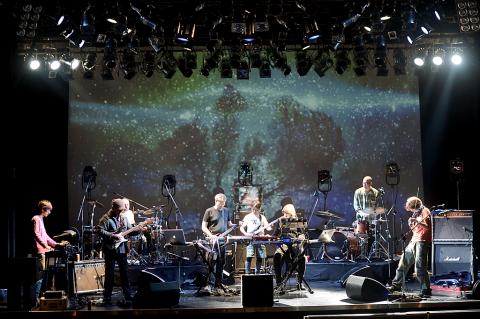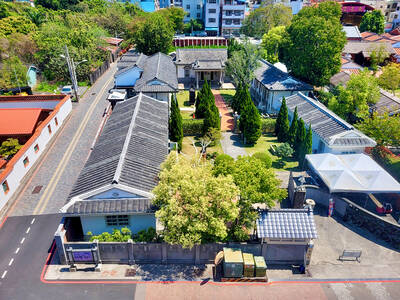At the beginning of this month, it looked as if Taipei would lose another live house. Pipe Live House (水管音樂展演空間), one of two low-cost venues for new bands in Taipei, was told that the city property it occupies had been rented to a major construction company. This new, commercially-minded landlord felt the rock club was basically a waste of space and decided to raise its rent from NT$45,000 a month to NT$80,000 a month. The goal was to push Pipe out to make way for a Western-style restaurant, according to a report in the Liberty Times (自由時報), sister newspaper of the Taipei Times.
As this news hit, the memory of Underworld (地下社會), a live house shut down by city regulators last year, was still fresh in the minds of Taipei’s music community.
Established two years ago, Pipe is a small live house that holds under 200 people and sits between a river and a water treatment plant. Almost impossibly for Taipei, it is in a location where you can play loud music and not bother any of the neighbors. The building it occupies is a historic, decommissioned pumping station that is part of the Taipei Water Park, a zone which includes the water treatment plant and several hectares of recreational land.

Photo courtesy of Kotaro Mababe
The Taipei Water Park was however recently rented to Chien Chung Construction Company (建中工程), whose primary business is spreading asphalt and pouring concrete. For NT$14 million a year in rent and an expected NT$25 million in renovations, Chien Chung gets to run the whole area for the next five years.
When this news came out earlier this month, the spirit of the Underworld rose up as a battle cry, something like “Remember the Alamo” did in Texas of the 1830s. Rockers filled the City Council gallery as Taipei City Councilor Yan Sheng-kuan (顏聖冠) accused the mayor of “trampling on culture.”
Now the city has given Pipe priority as a preexisting tenant, and mediated a rent increase to NT$60,000 a month, effective Jan. 1. Pipe manager Tong Zhi-wei (童志偉) says that for the moment, the live house will stay. “It sucks, but there is nowhere else we can go,” said Tong.

Photo courtesy of Kotaro Mababe
MAN DRIVE TRANCE
The Boredoms are often seen as the band that pushed Western punk rock into the uncanny and wholly new realm of Japanese noise, but their legacy is just as much about intensely rhythmic and multi-layered drumming as it is about free-form improvisation and experimental cacophony. When the Boredoms still play, they put at least three drum kits at center stage, and band leader Yamataka Eye has famously helped produced Boadrum circles of up to 111 drum kits playing simultaneously, creating a kind of meta-rhythm. Former Boredoms member Yoshimi built her band OOIOO around two drum kits and various percussionists as well.
There are also two drum kits in Rovo, which is probably the most regular Boredoms spin-off band. It will appear at Legacy tonight, playing a continuous two-hour trance jam together with British space rockers System 7.
Formed in 1996 by Boredoms guitarist Seichi Yamamoto and electric violinist Katsui Yuji, Rovo channeled the Boredoms’ fascination with cosmic phenomena into the realm of electronic dance music, specifically trance, which was gaining huge popularity in Japan at the time. Somewhat unique to Japan, the wave of trance was not just driven by DJs, but also by musicians in ballooning pants and tie-dyed t-shirts, who were playing live trance on guitars with weird effects pedals, spacey keyboards and of course lots of drumming.
Rovo founder Katsui, contacted through e-mail earlier this week, explained that in comparison to DJed trance, “instrumental trance music [performed] by human beings with a band style…[is] more dynamic.” The goal, he says, is to fulfill music’s most primitive and ritual functions, “prayer and dance.”
“Rovo always thinks, what’s the root of music? What’s the purpose of music? Why did people need music in the beginning? We think it’s for prayer and dancing,” he said.
Rovo calls their music “man drive trance,” and when performed live it is somewhere between a psychedelic jam band and instrumental electronica. They also borrow freely from ambient, jazz, world beat and prog rock. It would probably be best to see them at a festival playing under the stars or on a beach, but an indoor venue with an intense light show will also do in a pinch. The band has so far produced more than a dozen albums (including a full album with only one track) and has become regulars on Japan’s festival circuit.
Rovo’s most recent album, Phoenix Rising, was produced in collaboration with System 7, the UK duo of Steve Hillage and Miquette Giraudy. The 62-year-old Hillage, a veteran of Britain’s psychedelic scene of the 1970s who two decades later went on to set up the first ever “Dance Tent” at the Glastonbury Festival, is in fact one of Katsui’s musical heroes.
“When I was young I dreamed of joining Steve Hillage’s band, and now my dream has come true. I’m playing with Steve Hillage,” Katsui says.
Though recent performances in Japan featured Rovo and System 7 separately, “In Taiwan we have only one set. We will entirely focus on playing in one big jam,” including “songs from both bands.”
Rovo and System 7 perform tonight from 8pm at Legacy, 1, Sec 1, Bade Rd (台北市八德路一段1號). Tickets are NT$1,500, or NT$1,200 in advance through www.indievox.com.
TWO DOOR CINEMA CLUB CANCELS
Two Door Cinema Club, the Irish rock band launched by the French dance music label Kitsune, is young, disinterestedly good-looking and plays the kind of catchy pop tunes kids love to dance to. They were scheduled to play Sunday in Taipei, but have unexpectedly cancelled their Asian tour.
“We never cancel shows and normally we would struggle through any illness to play for you guys but unfortunately Alex [Trimble] is suffering from an acute form of laryngitis,” said the band in a statement that sounds like it was borrowed from a Brady Bunch episode. “It’s clear that there is no way that he will be able to sing for the next week at least.”
Other gigs continue to fill up the Taipei calendar. James Blake will play Legacy on Jan. 17 (NT$2,400), and Earwax has just announced a six-band mini-festival that will include Mogwai, The National, Daughter, King Krule and Youth Lagoon. The performances will take place over two nights at Legacy on Feb. 18 and Feb. 19, and early bird two-day passes were on sale Tuesday night at Franz Ferdinand — an awesome show, by the way — for NT$4,200.

April 28 to May 4 During the Japanese colonial era, a city’s “first” high school typically served Japanese students, while Taiwanese attended the “second” high school. Only in Taichung was this reversed. That’s because when Taichung First High School opened its doors on May 1, 1915 to serve Taiwanese students who were previously barred from secondary education, it was the only high school in town. Former principal Hideo Azukisawa threatened to quit when the government in 1922 attempted to transfer the “first” designation to a new local high school for Japanese students, leading to this unusual situation. Prior to the Taichung First

Chinese Nationalist Party (KMT) Chairman Eric Chu (朱立倫) hatched a bold plan to charge forward and seize the initiative when he held a protest in front of the Taipei City Prosecutors’ Office. Though risky, because illegal, its success would help tackle at least six problems facing both himself and the KMT. What he did not see coming was Taipei Mayor Chiang Wan-an (將萬安) tripping him up out of the gate. In spite of Chu being the most consequential and successful KMT chairman since the early 2010s — arguably saving the party from financial ruin and restoring its electoral viability —

The Ministry of Education last month proposed a nationwide ban on mobile devices in schools, aiming to curb concerns over student phone addiction. Under the revised regulation, which will take effect in August, teachers and schools will be required to collect mobile devices — including phones, laptops and wearables devices — for safekeeping during school hours, unless they are being used for educational purposes. For Chang Fong-ching (張鳳琴), the ban will have a positive impact. “It’s a good move,” says the professor in the department of

Toward the outside edge of Taichung City, in Wufeng District (霧峰去), sits a sprawling collection of single-story buildings with tiled roofs belonging to the Wufeng Lin (霧峰林家) family, who rose to prominence through success in military, commercial, and artistic endeavors in the 19th century. Most of these buildings have brick walls and tiled roofs in the traditional reddish-brown color, but in the middle is one incongruous property with bright white walls and a black tiled roof: Yipu Garden (頤圃). Purists may scoff at the Japanese-style exterior and its radical departure from the Fujianese architectural style of the surrounding buildings. However, the property